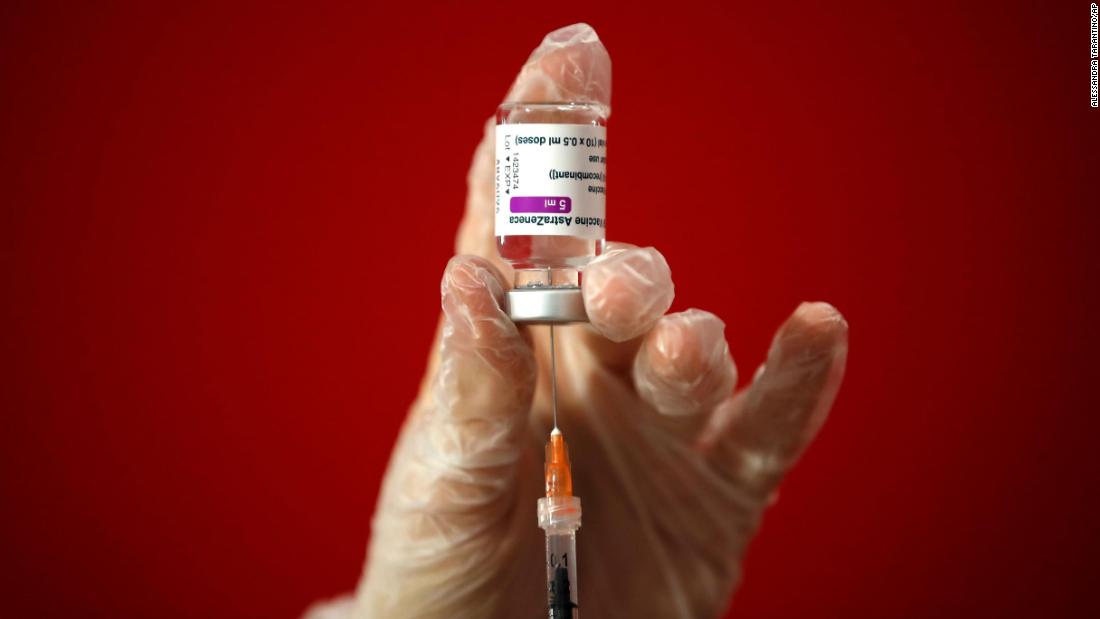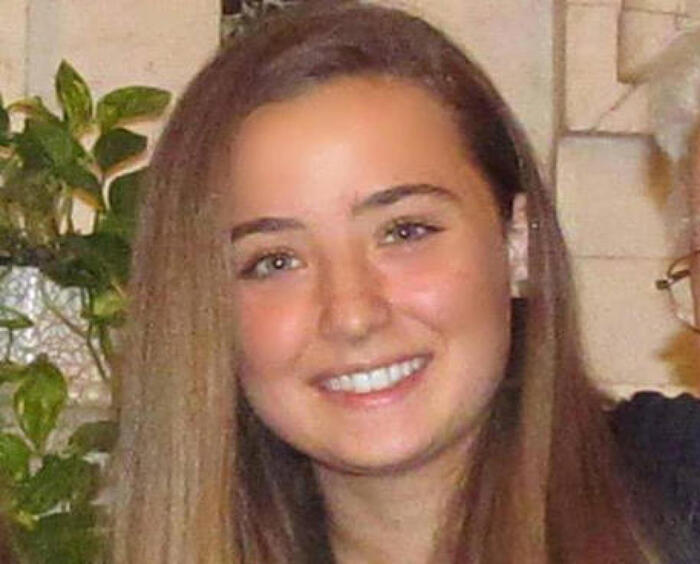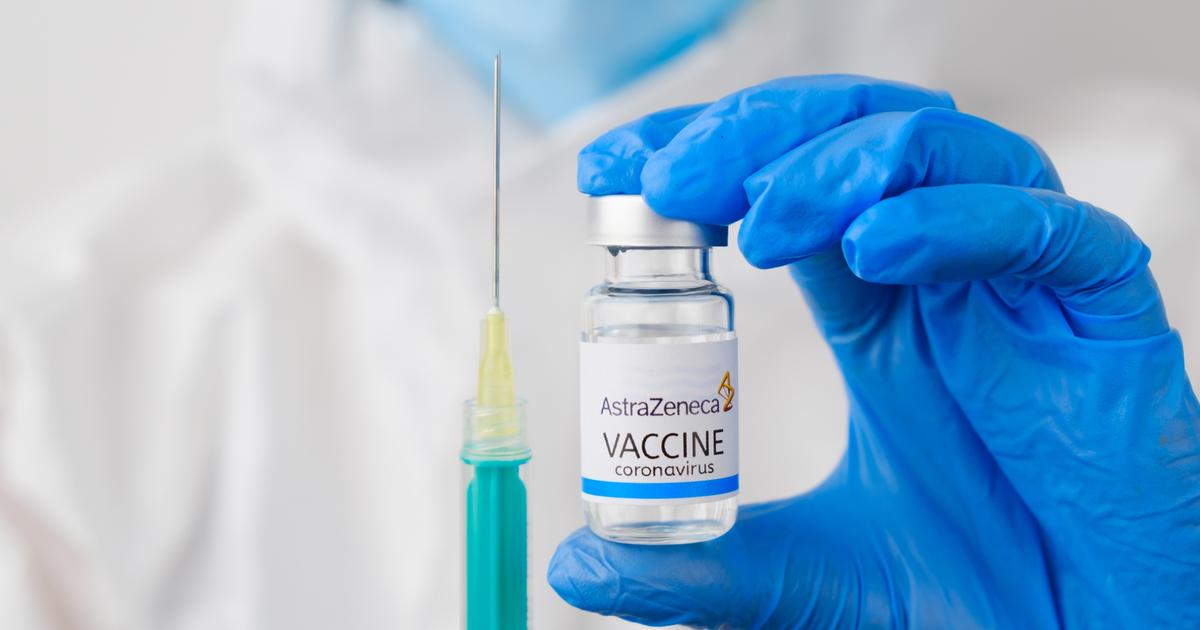Doctor answers questions about AstraZeneca vaccine 3:14
London (CNN) -
In the space of a few days, the application of the Oxford-AstraZeneca COVID-19 vaccine has stalled in virtually all of Western Europe.
France, Spain, Germany, Italy and more than a dozen other countries have halted deployment of the vaccine, calling it a precautionary measure due to concerns that it could be related to blood clots;
decisions that go against the advice of world health agencies.
Some countries have supported the vaccine, including the United Kingdom, where more than 11 million doses have already been administered and where real-world data has shown that vaccines are reducing infections and hospitalizations.
The actions of European governments have surprised experts and raised countless questions from people who have had or are online to receive the vaccine.
But the general message from health experts is calm;
When put into context, reported cases of blood clotting are rare and no greater than they would be in the general population, while the vaccine has been shown to work to reduce COVID-19 cases.
advertising
“Right now, I just don't see any reason for a country to discontinue the AstraZeneca vaccine.
It doesn't really make a lot of sense to me, ”Michael Head, senior researcher in Global Health at the University of Southampton, told CNN.
'These vaccines are to protect against a pandemic virus.
There is an urgency in the deployment, "he added.
"So stopping a vaccine campaign for no very good reason right now seems like a bad decision."
LOOK
: Blood clots related to AstraZeneca vaccine are probably a coincidence, says a doctor
How we got here
Europe has taken a confused stance towards the AstraZeneca vaccine since it was first approved for use in the European Union in late January.
In the space of a few weeks, several EU countries have angrily rebuked the company for not delivering the full amount of doses promised;
they have cast doubt on its efficacy in older people only to later reverse their stance;
they have prevented shipments of the vaccine from leaving the continent;
and now they have halted their deployments over concerns about links to blood clots.
"The AstraZeneca vaccine candidate seems to have been a bit of political football, for reasons I really don't understand," Head said.
"It was not very edifying to see it from a scientific point of view," he added.
"In terms of the science behind the vaccine, it's safe, it's effective, it's a very good vaccine."
The latest episode began last week when Denmark paused the vaccine for two weeks, citing some reports of clotting in people who had received the injection, including one fatal case.
Norway soon followed, citing reports of three clotting cases, including one death reported Monday.
Those incidents have not been confirmed to be related to the vaccine.
Since then, virtually all of Western Europe has stopped using the injection, but countries remind citizens that such decisions are precautionary while they wait for the European Medicines Agency (EMA) to review the incidents.
The agency will meet on Thursday and the World Health Organization (WHO) is reviewing the reports on Tuesday, but both agencies have said there is currently no evidence of a link to blood clotting, with the EMA adding that the benefits of the vaccine outweigh the risks.
How many cases are there?
And are they serious?
Doctor answers questions about AstraZeneca vaccine 3:14
No cases of clotting have yet been associated with the vaccine;
that's what the EMA and WHO are discussing, and the EMA is expected to issue its advice to countries on Thursday.
But even the reported cases of clotting in inoculated people are very few and far between.
In Denmark, a death triggered the initial wave of suspensions.
After administering 1.7 million doses of AstraZeneca, Germany has discovered only seven cases of blood clotting - although a rarer type known as cerebral vein thrombosis, a blood clot in the cerebral vein of the brain - said the Monday Dirk Brockmann, epidemiologist at the Robert Koch Institut.
The Norwegian Medicines Agency said that three patients currently in the hospital "have a rare disease picture" because the patients have an unusual combination of low platelet counts, blood clots in small and large vessels and bleeding.
Similar combinations of symptoms have not been seen in people who received other vaccines, the agency said.
A Dutch laboratory has received 10 reports of blood clots in vaccine recipients, but with a different set of conditions than in Norway.
The reported incidents are not numerous enough to cause concern among health experts.
Last week, the International Society for Thrombosis and Haemostasis (ISTH) recommended that all eligible adults continue to receive their covid-19 vaccinations.
"The small number of thrombotic events reported in relation to the millions of covid-19 vaccines applied does not suggest a direct link," the society said in a statement.
He added that "based on all available data, ISTH believes that the benefits of the covid-19 vaccine far outweigh any potential complications, even for patients with a history of blood clots or for those taking anticoagulant medications."
Jon Gibbins, director of the Institute for Cardiovascular and Metabolic Research at the University of Reading, agreed that the number of clots reported was small.
"The numbers involved are small, and probably not more than you would expect in a population anyway," he told CNN.
Several experts have said the same thing.
Blood clotting, or thrombosis, occurs for a variety of reasons, and venous thrombosis is relatively common (affects 1 to 2 in 1,000 people), Gibbins explained, adding that the risk of thrombosis increases with age and that there are additional risks for some people.
underlying health conditions.
MIRA
: Virology specialist asks that we not "demonize" vaccines
And that makes it not surprising that some isolated cases of clotting occur in people who have received the vaccine.
"When you start immunizing millions of people, this inevitably happens from time to time," Gibbins said.
"But it doesn't show causation, it doesn't show that the vaccine is really responsible."
"From what we've seen in the millions of doses of AstraZeneca, serious side effects are literally the proverbial one in a million," said the Southampton Head expert.
But Gibbins noted that the cases of brain clotting in Germany were notable.
"Cranial sinus vein thrombosis (CVST) is a rare type of thrombosis that affects five out of every million patients," he said.
He added that the specific circumstances surrounding those cases are not yet clear.
Paul Hunter, a professor of medicine at the University of East Anglia, agreed that the association should be fully investigated, but stressed that the risk of dying from COVID-19 was substantially higher than from CVST.
What does the data show?
AstraZeneca doubled down on the safety of its injections on Sunday, saying a careful review of the 17 million people inoculated with the vaccine in the EU and Britain again found there was no "evidence" of a link to clots.
It found that of those millions of people, there have been 15 deep vein thrombosis (DVT) events and 22 pulmonary embolism events reported after vaccination;
less than the number that would be expected to occur naturally within that population size.
"The general lesson is that vaccines provide an excellent level of protection," Gibbins said.
It is also important to note that people who receive the AstraZeneca vaccines may be more likely to have blood clotting anyway.
'People who get vaccinated, particularly in Europe, where they are still at an early stage of implementation, are mostly older populations and clinically vulnerable people.
So you should expect to see higher rates of blood clots in those populations, ”Head said.
Most importantly, the vaccine provides protection against a disease, covid-19, which itself causes blood clots.
"One thing that we are absolutely certain of is that covid infection, and particularly in people who are hospitalized with covid infection, carries a substantial risk of having blood clots," Gibbins said.
"The biggest risk of this is that we reduce the intake of vaccines in general and, as a consequence, we increase the risk that people have blood clots simply because they are infected with COVID-19," he added.
LOOK
: Four reasons why you won't be able to get rid of the mask immediately after getting vaccinated
Could the vaccine have caused the clotting?
Experts agree that it is highly unlikely, but not impossible, that the vaccine could have caused the cases, but so could other factors.
'They are probably not caused by the vaccine.
There is no obvious biological mechanism to indicate that they are caused by the vaccine, ”Head said.
In the past, some vaccines have been shown to have rare but serious side effects.
For example, concerns about side effects were raised during the 2009 H1N1 swine flu pandemic, where one of the vaccines used was eventually found to have an association with narcolepsy.
But even if this were the case here, the data so far shows "levels so low that I wouldn't see any reason to pause a launch," Head said.
And the long shot doesn't outweigh the risks of stopping vaccines, experts said.
"I would say it is much more beneficial to vaccinate people against COVID than to pause the vaccine because of a very, very, very unlikely association with bleeding disorders," Stephen Griffin, head of the Antiviral research group, told CNN. and Viral Oncology at the University of Leeds.
"The risks of covid in the population are much, much higher than the possible side effects of any vaccine," he said.
The immediate consequence of the deployment pause could be greater, as people miss vaccination appointments or see delays in their vaccinations.
"People who would not need to be infected" will be infected as a result of the suspensions, Head added.
"Even if the hiatus is brief, just a few days, that means the deployment hasn't reached as many people as it should, including high-risk people."
What do world health agencies say?
WHO calls for the AstraZeneca vaccine to continue to be applied 0:42
We will hear more from the EMA and WHO this week, but both agencies have said that countries should continue to administer AstraZeneca injections while the reviews take place.
"While its investigation is ongoing, the EMA currently holds the view that the benefits of the AstraZeneca vaccine to prevent COVID-19, with its associated risk of hospitalization and death, outweigh the risks of side effects," said the agency.
The WHO added that vaccination campaigns should continue.
"To this day, there is no evidence that the incidents are caused by the vaccine and it is important that vaccination campaigns continue so that we can save lives and stop the severe disease of the virus," the global agency said in a statement to CNN on Monday.
The organization added that it was evaluating the latest reports, but said any changes to its recommendations would be "unlikely."
The WHO will meet on Tuesday to review the data, and the EMA is currently reviewing the evidence and is expected to render its verdict on Thursday.
LEE
: A dangerous variant of covid-19 is about to become dominant in the US, according to experts
In the UK, where more than 11 million doses of the vaccine have been distributed, health officials are equally firm in their confidence.
"We are reviewing the reports closely, but the available evidence does not suggest that the vaccine is the cause," Phil Bryan, head of vaccine safety at Britain's drug regulatory agency, said in a statement Monday.
"People should go get the covid-19 vaccine when asked," he said.
So why are European countries suspending the vaccine?
Which countries have suspended the use of Astrazeneca and which have not?
1:44
Countries that have suspended the vaccine have said the measures are precautionary.
And while experts are surprised by the pace, they note that it is not uncommon for medications and vaccines to be reviewed once they are in use.
It's part of the normal process.
This would happen normally, it's just that no one would really know because we wouldn't be in the middle of a pandemic, ”Gibbins said of the vaccine safety reviews.
Countries will wait to hear guidance from the EMA, but many have expressed their desire to continue the deployment soon.
Irish Prime Minister Micheál Martin told CNN that he would like questions about AstraZeneca's vaccination to be concluded by the end of this week and that he believed the country could 'catch up pretty quickly on the vaccines that they had to be postponed. '
And the French Health Minister, Olivier Véran, tried to reassure people who had received the vaccine in the past, stressing that they are "not in danger."
Could concerns raise questions about vaccines?
Overall, experts expect European countries to re-implement AstraZeneca vaccines soon, but the long-term impact of the episode is cause for concern.
"I'm concerned about doubts about vaccines in Europe," Head said, saying that previous comments by French President Emmanuel Macron on the efficacy of the AstraZeneca injection in older people are "useless" and emphasized that recent fears about blood clots could aggravate the problem.
LEE
: Anti-vaccine activists are selling theories that covid-19 vaccines are deadly, undermining vaccination
"A scare like this has the potential to raise doubts about vaccines," he said.
Skepticism towards COVID-19 vaccines is particularly high in France and has been towards other vaccines in recent years, studies have shown.
And even concerns about a specific injection could slow the world's route out of the pandemic.
"What we don't want is for people to say, I'm going to wait for another vaccine," Head said.
"Not enough people will be protected, implementation will be hindered, and there will be more COVID-19 cases than there should be."
CNN's Meera Senthilingam contributed to this report.
AstraZeneca








